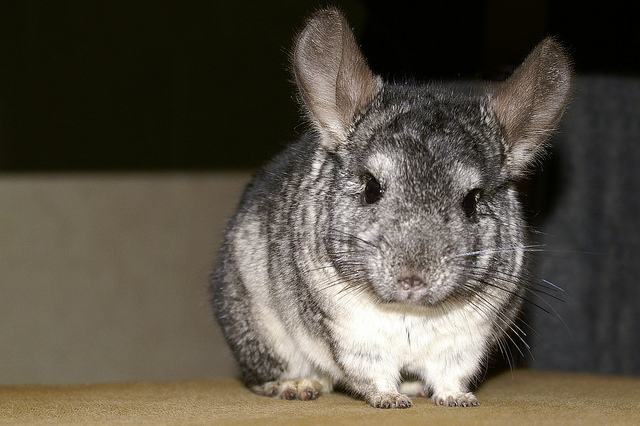Chinchilla Corner is reader-supported, if you purchase any products through the links below we may receive a small commission. Learn more

Chinchillas are, in some cases, and in others, not considered hypoallergenic. They don’t have dander like other pets such as cats and dogs. It’s a rare occurrence that a person is allergic to a chinchilla itself. The reason someone might have allergy flare-ups around their chinchilla is more likely coming from their bathing dust, the hay they eat, or dirty, urine-soaked bedding.
What is Hypoallergenic?
The definition of hypoallergenic is relatively unlikely to cause an allergic reaction.
According to the definition of hypoallergenic, I would have to say that chinchillas are hypoallergenic or as close to it as they can be. My research shows that people are rarely allergic to chinchillas themselves. People with chinchillas are more likely to be allergic to the dust or hay they’ve purchased for their pets.
What makes a Chinchilla Allergy Friendly?
Chinchillas don’t shed dead skin that is considered an allergen. They don’t shed like other furry pets might. They can drop their fur lightly at season changes, but that’s about it. Chinchillas are also odorless. If they have a smell, they may be sick, or their cage isn’t clean. All these factors make chinchillas one of the most hygienic animals around.
You may be wondering why you or someone you know seems to be allergic to your chinchilla. Well, the most likely reasons are that you or your friend aren’t allergic to your little fluff ball at all. You may react to their bath dust, feed, or dirty cage.
How do you fix that, you ask? Well, let’s look, shall we?
Reasons your Allergies May Flare-up and their Solutions
#1 Dust Baths
Your chinchilla will take dust baths two or three times a week. During this time, they may shake the dust off, and it will go all over the cage. Consider sitting a few feet from their enclosure while they dust themselves. If the dust is left to sit each time your chinchilla bathes, you may find that your allergies flare up. Again, an excellent reason to keep their cage clean.
The solution here is to clean up the dust, not just remove their dust bath, but the loose dirt that has collected on the bottom of the cage and perhaps other surfaces near their cage.
#2 Timothy Hay
Chinchillas eat Timothy hay either fresh or in pellet form. Some individuals who have hay or grass allergies may find that this will exacerbate their allergy symptoms.
Since your chinchilla must have food, you may find you have to wear a mask and perhaps gloves, like the ones your doctor wears to feed your chinchilla. There are latex, non-latex, and other versions of these, and they can be found and purchased at amazon. Research for the best gloves to suit you. Wash your hand after handling the hay, whether you wear gloves or not.
It might also be wise to wear an old shirt, an apron, or even a pair of overalls over your clothes. Depending on your allergies, you may not want to get hay on the clothes you plan on wearing all day.
#3 Their litter
The reason their bedding might make your allergies flare up is that the bedding is urine-soaked because their cage isn’t clean.
Safe bedding for your chinchilla is kiln-dried pine shavings, aspen shavings, or Carefresh, a paper product. Use the original Carefresh, which is a gray color and not treated. Fleece is another option you can use to cover the cage floor and shelves with no shavings. However, you should have more than one set of fleece covers so that you can wash one set while another is in use.
Cedar, mixed wood shavings, scented bedding, synthetic bedding, corn cob, or cat litter are not suitable for your furry rodent. Do not use them.
You can also set up a small litter pan with shavings in it and encourage your fuzzy furball to use it to go potty in. It may take some time to get your chinchilla potty trained. Some may not train at all. They aren’t known for their attention spans.
The important thing is to keep your chinchilla cage clean. Set up a regular cleaning schedule and keep to it. Your chinchilla will be happy and so will you, especially if your allergies are in check.
Final Thoughts
We now know that some information says that chinchillas are hypoallergenic, and other sources say they are not. I found in my research that they are the closest thing to hypoallergenic that they can be. They don’t produce dander as other furry pets do, and that is what causes peoples’ allergic reactions. So, it’s likely that if you are suffering allergy symptoms around your chinchilla, it’s not your pet itself. It is more often from the dust in their dust bath, the timothy hay they eat, or urine-soaked bedding. So, if you keep your chinchilla’s cage clean on a regular schedule and you take precautions like sitting a few feet from the pen while they bathe or wear a mask and gloves to feed them, you will alleviate those symptoms.
Are you an allergy sufferer that owns a chinchilla? Do you have any tricks that have made it easier to care for your chinchilla? Let us know in the comments below.
